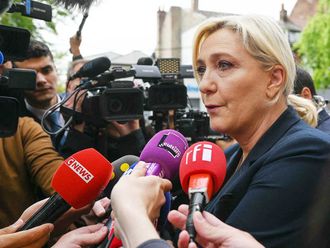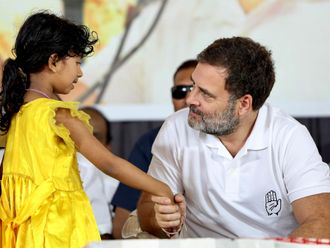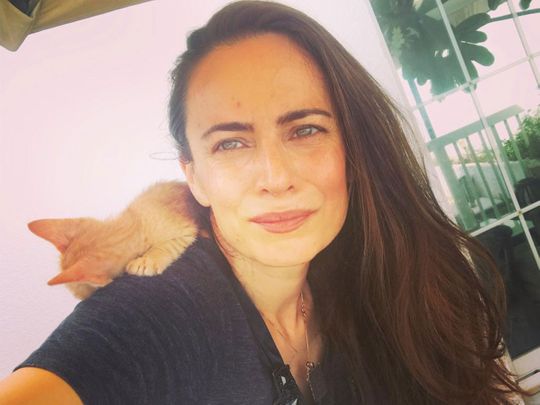
The first time I saw an Instagram video of Yasmin Ali Zaidi—Jazz for those who know her—with street dogs, I thought it was a supermodel’s good-deed-of-the-day, a celebrity’s contribution to a multinational’s CSR campaign. Not a supermodel or a celeb, but the stunning Jazz is many things: mother of two children—daughter, sixteen, son, ten; wife of a veteran PTI leader; stylist; writer; a Los Angeles trained fashion designer and merchandiser; and creator of Tunics by Jazz. Most importantly, Jazz is a humanitarian and an animal rights activist. And someone who loves animals with a rare passion. That special passion for animals makes Jazz my hero.
Jazz, Pakistani-Swiss, posts unfiltered photos and videos on her Instagram and Facebook about the dogs, cats, donkeys and bears she feeds, hugs, dotes on as she continues to work on developing her NGO. Her days are hectic with her home, children, husband, designing, but there’s never a moment when her concern for street animals lets her rest.
Currently, almost forty rescued animals—cats, rabbits, dogs—reside inside and on the green patch outside Jazz’s home. In her garage is Jazz’s Cat Hotel where her rescued darlings sleep and have enclosures for quarantining.
In different areas of Karachi, Jazz is seen petting street dogs, talking to them as if they’re her beloved pets, giving them food and water, showing people that street dogs are not dangerous, that they respond beautifully to love. During her dog-feeding sessions, she interacts with people who stare at her as if she’s an ET while she explains to them—sometimes exasperated but always patient—in her inimitable impassioned way that the only thing street animals need is a bit of empathy, a bit of food, a bit of humanity.
The most noticeable thing about Jazz’s incredible kindness to animals is her hands-on interaction with animals. She sits on the ground to talk to them; she has an affectionate dialogue with them as they gambol, run around and flop on their backs; she pats them with an ease that stems from profound tenderness; she sees beauty in their broken, emaciated bodies. Jazz is a friend, a guardian, an angel for the animals she touches with her love.
For Gulf News, I asked Yasmin Jazz Ali Zaidi a few questions:
Mehr Tarar: Your love for animals, when and how did it begin?
Yasmin Ali Zaidi: I think love for animals is something you’re born with. A gift from God. You can learn to love, but when you love animals so much you feel you could be their protector, it’s definitely innate. It has a purpose. I’ve loved animals since my childhood. My mother was an animal rescuer, so I was always surrounded by animals. I was always drawn to street dogs and cats, I never had any fear. Sometimes I feel I’m an animal whisperer. As a child when I lost pets, it was very painful. I still remember each pet I’ve ever had. They all have an imprint on my heart, my life.
I loved animals when I was in kindergarten. I used to take milk for animals to school, I felt their hunger. At a very young age I had powder milk in my desk, the only child in the entire school who used to make milk for street animals before attending the first class.
My son is like me—an animal whisperer with a gift. Animals are drawn to him, and he to them. When you approach a street animal, they instinctively know you’re someone who comes with love and will defend them. They see it, sense it. From me, from my son.
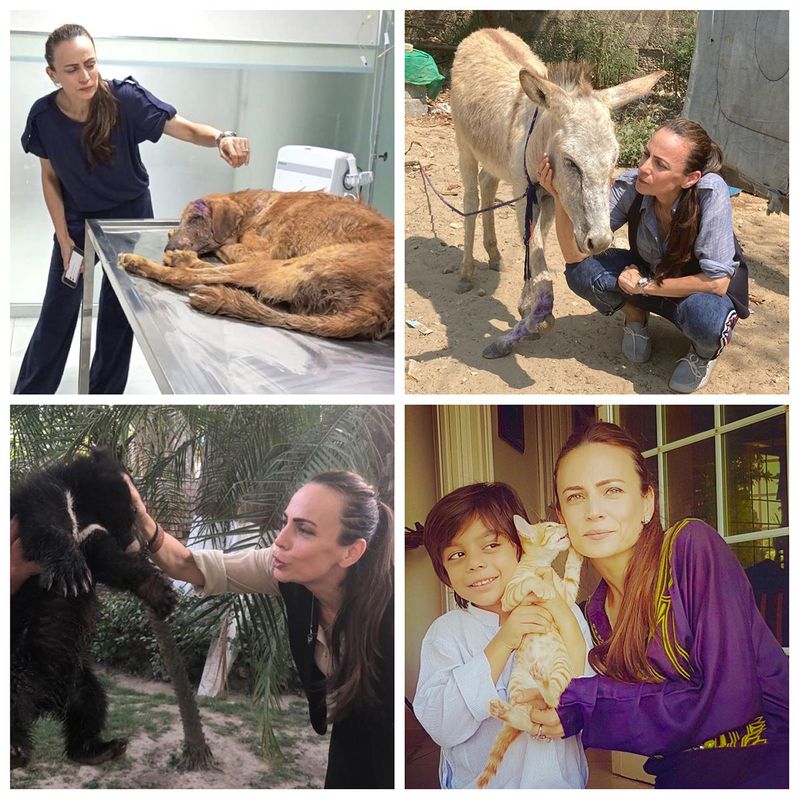
You feed dozens of street dogs every day. What’s your process for such a huge responsibility?
Yes, I feed street animals, every single day, rain or sun. It’s something I’ve been doing for a long time, especially during the peak of COVID-19 when animals couldn’t find food on the streets. It’s a lifelong thing; I can’t rest if I know they’re hungry, I’ve to feed them. I usually carry food with me wherever I go. If I see a hungry animal, I don’t turn my back, and I give them milk or dry food.
I’ve created a system with fifteen-twenty feeding spots where I place cooked food for animals. If I’ve extra, I give it to an animal I see on a street. It makes my day. I know they’re hungry, no one will feed them, and that is why I’ve a mechanism for feeding street animals. A self-commitment. I take a huge pot of cooked food—chicken, meat, rice, healthy vegetables. I’ve placed mud dishes in those spots, sometimes the dishes are stolen but I keep replacing them. At night, we—my driver and I—place fresh water and food in our feeding locations. Animals in those areas now know where they can find food and water.
I’ve recently added to the feeding spots, I “adopt” the areas where I feed animals.
Some feeding locations are near garbage heaps. I want street animals to go to the trees where my pots of fresh food and water are placed. I also give them dry animal food. Sometimes, we place paper plates if we see more hungry animals. It’s like a soup kitchen for animals. The dogs and cats we feed now wait for the food every night.
I wish I could feed the whole city, the whole country. If everybody did their part and put leftovers or other food and a pot of water outside their homes, animals will be well fed at least once a day. I’ve asked restaurant managers to place their chicken and meat leftovers in areas where animals look for food. We need certain practices in a country where animals starve on the streets. End misery and hunger. Help find animals a decent meal at night, at least once in the whole day. It’s also good for the environment as leftover food instead of being wasted goes to animals to sustain their lives. These animals are part of our ecosystem, they protect us, despite the misconceptions about them.
Our religion teaches us to take care of and feed the weaker beings. God is testing us, watching us. He has instructed us to feed, nurture and take care of animals. If everybody did that, there’ll be less hunger and misery in this world.
Fasting in Ramadan teaches us to have empathy: to feel the hunger and thirst of other beings. Why can’t we have this practice of empathy for animals all year around? For me, Ramadan is year-long; not a day when I stop thinking about feeding animals. If I don’t feed an animal, it bothers me. I buy something if I don’t have food with me, and once I’ve fed an animal, I feel my soul is at ease.
What is the philosophy of Your NGO, “Jazz The Animals Voice”?
My NGO Jazz The Animals Voice, “Bezaban ki Awaaz”, is for animal welfare and rights: rescue, save, nurture, feed, protect. In our country, countless street animals are abused and killed, their lives are endangered, they starve. Being an animal lover, that’s unbearable to me. I can’t look away. I pick up animals abandoned on streets. That’s how my NGO came into being. I’ve a network, we rescue animals, and we try to do it across Pakistan with the help of others. I believe in teamwork; if our goal is to help animals, we need to work together.
Animal rights are very important; just as we humans should have rights, animals should have rights. Nobody should have the audacity to shoot or poison an animal just because they don’t like them or have never been taught to love animals. Animals have rights in Islam and in society. They’ve a right to live because God has given them life. Only He can take it.
To have an animal sanctuary is very important to me. Every day I encounter the problem that I don’t have a place where my rescues can live happily and be taken off the streets forever. Dogs are in danger everywhere; I want them to be safe. Currently, I’m in the process of developing a two-acre land and collect funds to build a sanctuary for homeless, abused animals. An animal haven where they can be medically treated, spayed, neutered, adopted, and if not, they’d always live there happily. I’ve a vision of a play area, a happy safe place for animals. Most countries have animal sanctuaries, but in Pakistan we don’t have many such places. My goal is to build a home for animals on an urgent basis.
With my NGO I plan to focus on animal policing. We need to have animal protection police to make abuse and killing of animals a crime, in the true sense of the word. No one has the right to shoot a dog just because they’re on their street trying to survive, looking for food; kill a cat; abuse a donkey; steal someone’s pet to sell; trade animals illegally. In the absence of animal police, sometimes we’ve had to personally intervene to save animals. People need to know that they’re answerable for the killing of an animal just as they’re answerable for the killing of a human being. The Holy Quran states that killing God’s creatures is a sin for which you’ll be questioned.
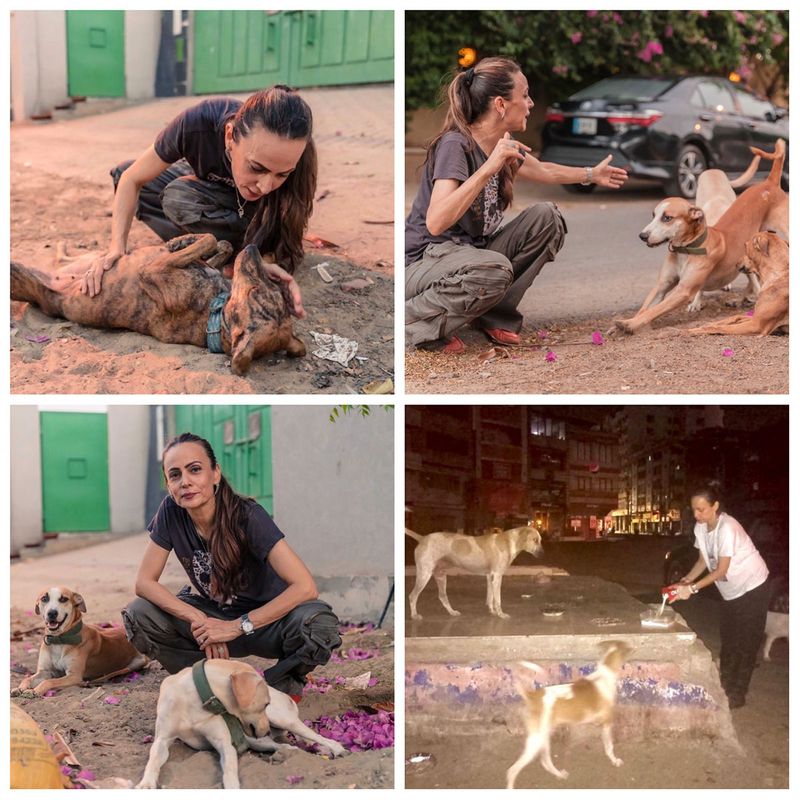
What is the most painful aspect of cruelty toward animals in Karachi, and other major cities of Pakistan?
It’s rampant. Almost similar cases of animal cruelty across Pakistan. Because of its size and population, more issues of animal cruelty in Karachi. The biggest reason is the societal mindset that doesn’t understand compassion for animals and their rights. That animals have feelings. That people have pets they love. That animals are part of your life in an ecosystem. That God created the world equally for man and animals. That we’re supposed to coexist. They don’t understand that being the higher, stronger being, the ones with a voice, it’s our duty to protect animals.
Street animals are merely trying to survive. You can’t kill them just because you dislike them. Lack of understanding of love for animals, and ignorance and misconceptions about animal behaviour lead to cruelty.
Poisoning and shooting of animals is rampant in our neighbourhoods, by not just the animal control department but also regular citizens. They kill starving animals, luring them with poisoned meat. Poisoned dogs suffer for hours before they internally bleed to death. Dogs are shot. Street dogs are victims of human cruelty. It’s humans and not animals who’re dangerous. Animals are harmless, innocent, they don’t do anything to you if you don’t do anything to them. You feed them, they’re loyal to you, and they love you back. They never leave your street, and they protect your homes, neighbourhoods, children.
Donkeys are made to race and hit with sticks to go faster. Whenever I see anyone do that, I stop them. Donkeys pull carts laden with iron and other heavy things. Donkeys that aren’t even adult are tied to another donkey and made to run. They suffer injuries, their legs broken, untreated, and then they’re dumped in streets. I’ve rescued donkeys with broken bones, just limping away.
Pets are stolen and traded in pet markets, there’s one in Empress Market. Animals are dying there, kittens and puppies in cages with no space to move, left without food and water, in the heat, at night. These pet stores don’t follow any SOPs, no checks and balances, no law they’re answerable to. Stolen or poached animals, dying of viruses, are caged, waiting for years to be freed. When they die, they’re thrown out like empty cereal boxes.
In villages across Pakistan, starved dogs are made to fight each other, sometimes fatally. Hundreds of people watch these sadistic acts without any empathy. Apathetically, they watch animals kill each other. As if they’re getting a kick from that.
Bears are forced to fight with wild dogs. Declawed, their teeth broken, these bears lack a defence mechanism. Helpless bears fight with helpless dogs. And people watch. This must be made illegal, people arranging and watching the fights must be arrested. It’s a ruthless, criminal act that psychologically impacts a society.
Mother bears are killed in mountains. Nursing cubs are stolen and placed in sacks, as if they’re inanimate things, to be traded in black markets. Someone I know bought a baby bear to rescue him; she surrogated him until the government officials took him. I saved that cub from a zoo, and now he’s in a sanctuary. His name is Dabboo. Another bear that I rescued is Balloo; I helped the Islamabad Wildlife Management Board to rescue these cubs. A sanctuary was created for Dabboo and Balloo where they live—happy, free.
What’re we doing in this world? Why don’t we fear God? If we don’t fear the law, we need to fear karma. We need to fear the wrath of God. We need to stop all kinds of cruelty to God’s creatures. God clearly states that we cannot be cruel to any living being. In Islam, examples of mercy and love for animals abound.
Animals, especially street dogs, are harmed and hated simply because people have a dog phobia. Were they never taught in their homes or schools to care for animals, to coexist with animals in our ecosystem? People growing up with a total lack of empathy for the suffering of animals enable desensitized societies that are conditioned to be apathetic to the suffering of other beings. Lack of compassion is the reason animals suffer in misery and hunger while society watches and turns its back on them every day.
I truly believe that if you’ve not loved or cared for an animal, a huge part of your soul and brain is not developed. Loving and caring for animals tap areas of your soul deep within, making you a more conscientious and sensitive person who respects humanity as a whole.
In the context of your first-hand knowledge of animal issues, do you think there’re ways to change dark societal attitudes towards animals?
With all my experiences with animal issues, I still believe a society can change if the mindset is changed. In countries with empathy and love for animals, there’s a concept of keeping pets and adopting animals from shelters. Our people don’t adopt, and they let animals die in shelters. They only want good breeds not street dogs. Most people in other countries understand that all animals are intelligent and beautiful. Our people don’t.
I believe if you’re kind and do good, people learn from you. They stare at me when they see me feed animals, be so committed. They understand that there’s somebody who made time to feed hungry animals. In the last three-and-a-half-years since my family’s return to Pakistan, people have seen me feed and care for animals. Sometimes, they seem shocked, sometimes awed. Occasionally, they approach me to say how much they admire my efforts, how beautiful it’s to see someone care for street animals. In a world where human suffering is ignored, how am I thinking about animals who don’t give me anything in return, they ask me. That means they respect what I do, it touched their hearts, and they learnt something. Sometimes, they tell me to pray for them; they believe that my prayers would be answered because of what I do for animals. I tell them to simply feed street animals, and God will listen to their prayers.
I post videos and photos for people to understand that the street-dogs-are-dangerous propaganda by government, local administration and people who just hate animals is an absolute lie. Street animals are nothing but pure love. The kind of love I receive from them, the way they listen and understand me, I wish I could rescue every animal on the street today. I post stuff to inform and for mindsets to change. People message me when they see my unedited videos with animals. They tell me I inspire them, and because of what they see me doing, they’ve started to feed animals. That makes me really proud that what I’m doing, selflessly, is making a difference.
I feel happy if I’ve changed even one mindset; that means there’s still hope for more people to change. We must continue to do good things. We must teach one another kindness, forgiveness. We must teach that animals are a very important aspect of our society. God created animals, He loves His creations, so how can we not love them?
Things can change by practice and educating the younger generations to be kind, to be good. They must not inherit their parents’ phobias. Schools should teach the importance of compassion for animals. Make laws to create a strict environment in which people cannot kill animals. With shorts films and messages, media can create a great deal of awareness.
My message is if you cannot love animals, at least do not harm them. Animals have a right to life. A mother dog with puppies is just like a human mother. She feeds and protects her puppies. She doesn’t want anyone to harm them, so she barks. She doesn’t mean any harm. All she’s telling people is to stay away from her babies. Animals know when they’re being harmed, their puppies stolen. We must understand animal behaviour. We must respect their rights. When you see a hungry animal, a nursing dog, please give them food.
We must not give up hope because hope is everything. We must continue to preach love and respect for animals. Animal cruelty is a sin and compassion is heavenly. When we have mercy on God’s creatures, only then God has mercy on us humans.





